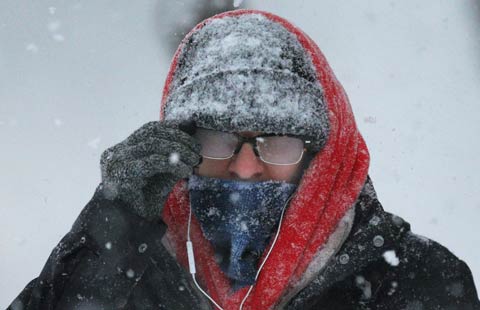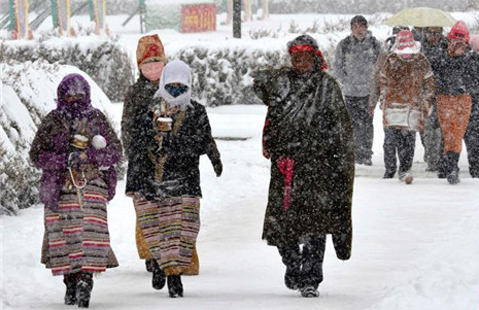China's farm produce prices rise ahead of holiday
Updated: 2015-02-17 17:32
(Xinhua)
|
||||||||
Weaker food prices and distortions from the impact of the upcoming Lunar New Year might have dragged down the CPI, according to economists.
The Lunar New Year holiday, which falls in January or February each year, sees a surge in consumer spending and widespread business shutdowns, which can produce year-on-year distortions. This year, the holiday starts on Feb 18.
In January, food inflation fell to 1.1 percent year-on-year from 2.9 percent in December, while nonfood inflation dropped to a 59-month low of 0.6 percent, the NBS said.
The Producer Price Index also dropped to its lowest level since the global financial crisis. It declined by 4.3 percent from a year earlier, compared with the 3.3 percent fall in December.
Plunging world oil prices drove down the CPI by 0.07 percentage point, and they contributed 65 percent of the PPI's drop in January, said Yu Qiumei, a senior economist at the NBS.
The figures also reflected weak underlying demand growth, economists said.
"These data help explain last week's decision by the People's Bank of China to cut reserve requirement ratios, which was a helpful but likely insufficient policy move," said Song Yu, an economist at Goldman Sachs Group Inc. "We expect further easing, with a benchmark rate cut likely before the end of the first quarter."
The central bank cut the amount of cash that all banks must set aside as reserves by 50 basis points, which was the first broad cut since May 2012.
JPMorgan Chase & Co lowered its CPI prediction for this year to 1 percent from 1.5 percent.
Zhu Haibin, chief economist in China at JPMorgan, said that the government will likely speed up pricing reform for utilities such as natural gas, electricity and water, as well as transportation, to help offset the imported disinflationary pressures of lower oil prices.
"Further softness in the inflation trend points to rising levels of real interest rates, which tend to intensify the pain of economic adjustment amid sluggish domestic demand and high levels of domestic leverage. As such, combining the concerns about near-term growth and the low inflation environment and PPI deflation will likely trigger further pro-growth measures," said Zhu.
Deflation has become the real risk for the Chinese economy, and this concern may prompt the central bank to further ease monetary policy, said Liu Ligang, chief economist in China at Australia and New Zealand Banking Group Ltd.
To ease the deflation risk and curb huge capital outflows, Liu forecast that the PBOC is likely to cut the deposit interest rate by 25 basis points in the first quarter of this year.
Liu said there may also be another 50 bps cut in the reserve ratios in the second quarter.
Most Viewed
Editor's Picks

|

|

|

|

|

|
Today's Top News
New visa policy draws more Chinese tourists to US
UN Security Council slams IS murders of 21 Egyptians
Austria on high alert following Denmark terror attacks
Web users deride, defend rouble-weather link
China to import more iron ore from Vale
Mexico makes moves to attract more Chinese tourists
Brazil, Peru and China to specify railway details
Growing up recluse in a dazzling world of Manhattan
US Weekly

|

|















